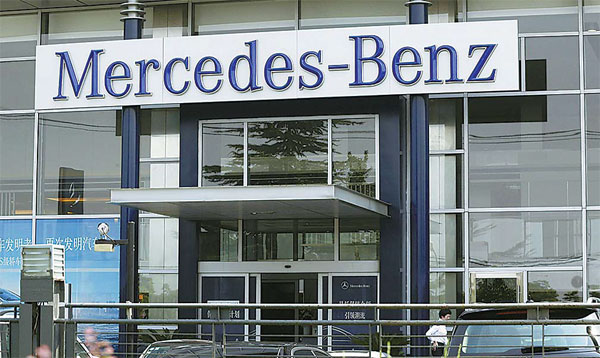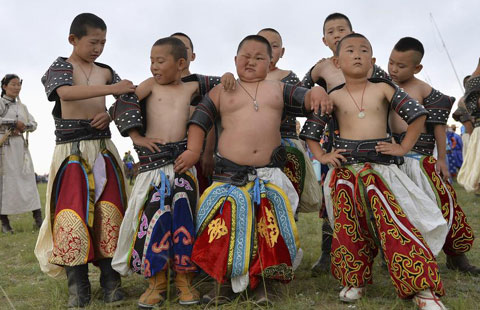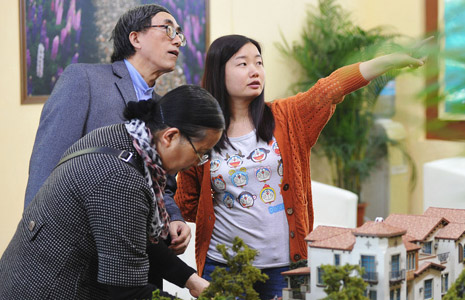Pressure builds on big carmakers
Updated: 2014-08-08 07:17
By Zhao Yinan and Li Fangfang (China Daily Europe)
|
|||||||||||
|
Mercedes-Benz's Shanghai office was paid a surprise visit by antitrust investigators from the National Development and Reform Commission on Aug 4, media reports say. Aly Song / Reuters |
Microsoft also under investigation and more inquiries in pipeline in antitrust breaches campaign
Experts have urged foreign companies to comply with China's antitrust laws amid a slew of investigations, with more in the pipeline.
The National Development and Reform Commission said 12 Japanese car companies have been investigated for suspected price manipulation of parts and bearings, and its bureaus in Shanghai and Hubei province are completing inquiries into Chrysler of the US and Audi of Germany.
It said these companies will be fined soon, but gave no further details. The announcement followed a raid on Mercedes-Benz's office in Shanghai on Aug 4 and its distributors in five Chinese cities the previous week.
Mercedes-Benz said it was helping authorities as Beijing Mercedes-Benz Sales Service Co confirmed that it figured in a commission antitrust investigation.
"We're actively assisting the investigation," the company said without elaborating.
Audi China said it was cooperating with the commission, Reuters reported. A spokesman for Chrysler in China declined to comment.
On Aug 6 officials of the State Administration for Industry and Commerce visited the offices of Accenture in Dalian, Liaoning province, which provides financial services for Microsoft China.
The administration, another antitrust regulator, is seeking evidence of suspected monopoly practices against Microsoft.
Accenture said it was providing client information to the Chinese government, but gave no further information.
Experts say the intensified antitrust investigations have been launched as regulators now feel more comfortable in dealing with them.
Huang Yong, deputy head of the expert advisory group of the State Council's anti-monopoly committee, said Chinese regulators have accumulated substantial experience in collecting evidence in the six years since the Anti-Monopoly Law was introduced.
Because of a lack of experience earlier, the law had not been enforced well. Foreign companies should be familiar with China's law, even if they have engaged in antitrust practices in other countries for years, he said.
Insiders said the Mercedes investigation may target the company's controls on regulating the lowest price for both completed models and parts to dealers.
If a company manipulates prices by controlling production, distribution and sales of a product, it violates the Anti-Monopoly Law.
Mercedes-Benz was the first company in the automotive industry confirmed to be under a government antitrust investigation after the Ministry of Commerce warned of illegal business actions in the sector several months ago.
China National Radio reported on Aug 5 that Audi was being investigated by the Hubei Commodity Price Bureau and Chrysler by the Shanghai Development and Reform Commission.
The report said investigations had found that the two companies took over the pricing rights for parts and maintenance services from dealerships and will be punished.
Several carmakers in the luxury sector have announced price cuts in the past two weeks.
The latest is Chrysler's China unit, which on Aug 5 announced 20 percent price cuts for 145 spare parts, a 650,000 yuan ($105,000; 79,000 euros) reduction for its Jeep Grand Cherokee SRT8 model and a 450,000 yuan cut for its 5.7L Grand Cherokee.
On Aug 3 Daimler said it would slash prices for more than 10,000 spare parts for its Mercedes-Benz cars in China from Sept 1. On Aug 1, Audi cut prices of spare parts for locally produced models by up to 38 percent.
Luo Lei, deputy secretary-general of the China Automobile Dealers Association, said, "Monopoly actions are common in the automotive sector, especially in the luxury sector, which is growing much faster than the overall industry."
Sebastien Evrard, antitrust partner at law firm Jones Day, said more Chinese companies can now see the benefits of relying on the antitrust law. He suggested that foreign companies should be more careful about their code of ethnics and with complying with local competition laws.
Recent investigations show that the government is stepping up its efforts to enforce the Anti-Monopoly Law, he said.
Under the Anti-Monopoly Law, the National Development and Reform Commission can impose fines of between 1 and 10 percent of a company's revenue for the previous year.
Colin Liu, a lawyer in the automotive industry, said: "The commission would normally set a percentage of annual sales in relevant markets as fines, based on how cooperative the companies are."
Referring to the 12 Japanese auto companies investigated for suspected monopoly violation on parts pricing, Nissan said it had not been investigated as of Aug 6. Others, including Toyota, Mazda and Honda, declined to comment, Bloomberg reported.
Industry experts said automakers have too much leverage over car dealers and parts suppliers, enabling them to control prices, considered a violation of China's anti-trust laws.
Yale Zhang, managing director of the consultancy Automotive Foresight (Shanghai), said: "Monopolistic practices are rampant in the auto industry. The commission is first targeting imported luxury brands because the problem is most severe in this area."
Contact the writers through zhaoyinan@chinadaily.com.cn
Li Jiabao contributed to this story.
(China Daily European Weekly 08/08/2014 page21)
Today's Top News
Putin bans agricultural imports from West
UK names 'China hand' as new envoy
China film looks to global audience
China to exclude Apple products
Dutch firm to take over MH370 search
Nanjing takes fresh approach to Youth Olympics
China to punish Chrysler, Audi over monopoly
Beijing boosts checks on foreigners
Hot Topics
Lunar probe , China growth forecasts, Emission rules get tougher, China seen through 'colored lens', International board,
Editor's Picks

|

|

|

|

|

|






